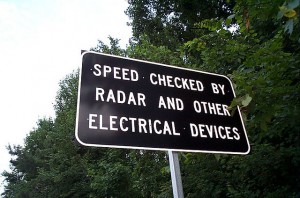 Speeding tickets are a significant part of municipal and state revenue, and these tickets are almost always issued based on the readings produced by speed radar. However, there are some radar errors that are the result if the innate fallibilities of the design or radar guns. These errors can be used by motorists to effectively defend themselves against speeding tickets issued based on radar readings.
Speeding tickets are a significant part of municipal and state revenue, and these tickets are almost always issued based on the readings produced by speed radar. However, there are some radar errors that are the result if the innate fallibilities of the design or radar guns. These errors can be used by motorists to effectively defend themselves against speeding tickets issued based on radar readings.
Discussed below are a few such errors that you must be aware of in order to determine the legitimacy of the speeding ticket issues to you.
Look-Past Error
One of the most common errors associated with stationary radar is the look past error.
- There is a common misconception that when the radar antenna is pointed in the direction of oncoming traffic, the reading that the patrol officer will receive is from the closest approaching vehicle.
- However, research reveals that the radar antenna has a tendency to pick up the fastest moving object in a group of moving objects.
- This particular fallibility in the design of radar makes it possible to challenge a reading that was obtained from approaching traffic in which multiple vehicles are within close proximity of one another.
If you have been ticketed under circumstances similar to those mentioned above, it may be worth it to challenge the ticket based on what is known as the look-past error.
Vehicle Interference
Another common issue with speed radar is the fact that it has a tendency to pick up the largest object in the approaching traffic within range. While an officer may be pointing the antenna at specific vehicle, it is possible that the radar could be picking up the speed of a larger vehicle behind the targeted vehicle, such as an 18-wheeler as much as a mile or more behind the vehicle that the officer is attempting to clock.
- There have been tests that reveal that it is possible for the radar to pick up the speed of larger vehicles that the officer does not even see yet.
- A radar antenna does not identify the vehicle that it is clocking, it only reveals the speed of the vehicle that it has locked in on.
- This particular issue places the officer in a position where they will have to trust a reading that may or may not be accurate.
Technical mistaken identity is more common than most people realize, and there is a possibility that a defense based on this type of error may actually prove effective.
Cosine Error
A cosine error occurs when a moving radar locks onto a stationary object, such as a building or large road machinery, that is positioned adjacent to the road on which the traffic that is being clocked is traveling on. The reason that the radar picks up these types of objects is the fact that they serve as a more efficient reflector than the horizontal pavement that the radar should be locked on to.
- When the radar is using anything other than the pavement as the reflector by which to judge speed, the clocked speed can be inaccurate.
- In the instant that the object in question is directly in line with the approaching vehicle, the more accurate the reading will be; however, the further from the direct line that the object is positioned, the more inaccurate the reading will be.
Due to the fact that this type of error is common, it may prove to be a viable defense for someone who has been ticketed for speeding in an area in which there are a number of sizable objects adjacent to the road.
Even though using the aforementioned radar errors does not guarantee that a speeding ticket will be dismissed, but these types of defenses have been effective in a number of cases. It is important to understand that each situation is distinct, and a person will have to determine what they believe is the route that will prove most efficacious.
[Image:https://www.flickr.com/photos/perspective/15086923687/]
Scott Desind
Latest posts by Scott Desind (see all)
- How to Request the County Seat and Fight Your California Traffic Ticket - May 21, 2023
- Don’t Even Touch That Cell Phone - July 13, 2022
- Innocent Until Proven Guilty - March 2, 2020

